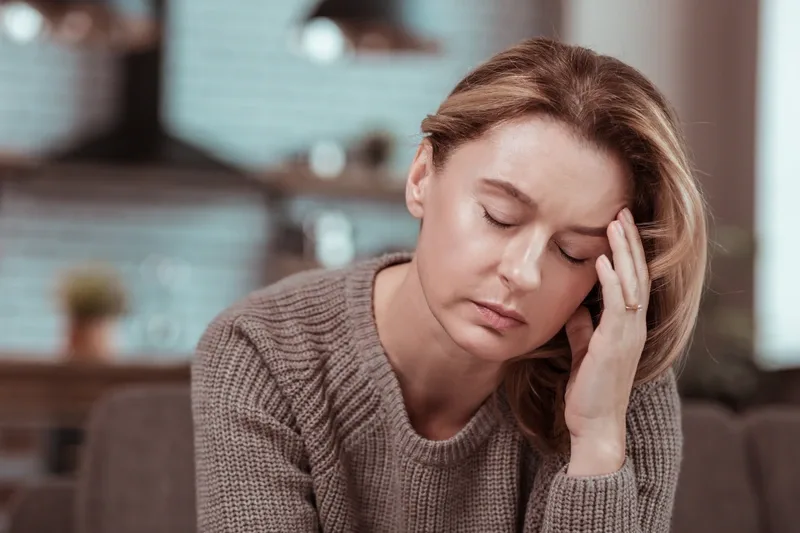Perimenopause is a natural and transformative phase in a woman’s life, with hormonal shifts introducing new physical and emotional experiences. Recognizing these changes early allows women to explore effective solutions and embrace this transitional phase with confidence and enhanced well-being.
What is perimenopause?
Perimenopause refers to the transitional phase leading up to menopause when the body begins to produce less estrogen, progesterone, and testosterone. Because all women's bodies are different, when perimenopause starts and how long it lasts may vary. However, this phase typically starts in a woman’s early 40s and can last from 2 to 10 years. Menopause is then defined after 12 consecutive months without a menstrual period.(1)(2)
Hormonal fluctuations during this time can cause a wide range of symptoms, some of which mimic other conditions, making perimenopause challenging to identify. Recognizing these symptoms can help empower women to seek effective treatments, such as hormone replacement therapy (HRT), to improve their quality of life.(3)
Perimenopause Stages
Early Stage
Early perimenopause often begins with subtle changes in the menstrual cycle. Ovulation may become less predictable, and periods may start to vary in length or flow. Symptoms in this stage, such as irregular periods or mild hot flashes, are often considered the first signs of perimenopause.(1)(3)
Late Stage
In late perimenopause, symptoms typically become more pronounced due to further declines in hormone levels. Periods may cease altogether, and other symptoms — such as more frequent hot flashes or night sweats — may intensify. This stage directly precedes the end of perimenopause and the onset of menopause.(1)(3)

15 Common Perimenopause Symptoms
1. Irregular Periods
Irregular periods are often the earliest indication of perimenopause. Menstrual cycles may become shorter, longer, or more unpredictable. Spotting between periods or skipped cycles is also common during this phase. These changes signal that the ovaries are producing hormones less consistently.(3)
2. Vaginal Dryness
Declining estrogen levels can lead to vaginal dryness, thinning tissues, and reduced elasticity, which may result in discomfort or painful intercourse. These symptoms are chronic but treatable with vaginal estrogen or systemic HRT.(3)
3. Hot Flashes
Hot flashes, characterized by sudden feelings of heat and sweating, are among the hallmark symptoms of perimenopause. They can begin years before menopause and vary in intensity.(1)(3)
4. Night Sweats
When hot flashes occur during sleep, they are referred to as night sweats. These episodes often disrupt sleep, leading to fatigue, irritability, and other issues.(1)(3)
5. Appetite Changes
Fluctuating hormone levels can disrupt the hunger-regulating hormones ghrelin and leptin, leading to hunger or appetite changes in perimenopause. HRT can help restore hormonal balance to manage these shifts.(5)
6. Weight Changes
Weight gain, especially around the abdomen, is common during perimenopause. Decreased estrogen and testosterone levels can alter metabolism and fat distribution.(1)(5)
7. Difficulty Sleeping
Hormonal changes often result in insomnia or restless sleep, impacting energy levels and overall health.(1)(3)
8. Mood Changes
Fluctuating hormone levels can affect mood and may lead to irritability, anxiety, or depressive symptoms. These changes are among the earliest signs of perimenopause.(1)(3)
9. Decreased Libido
Hormonal imbalances can lower sex drive, often accompanied by vaginal dryness or discomfort during intercourse.(4)(6)
10. Urinary Changes
Urinary changes and difficulty can arise during perimenopause due to decreasing estrogen levels, which impact the bladder and urethral tissues. Symptoms may include increased urinary frequency or urgency, stress incontinence, as well as a greater susceptibility to urinary tract infections (UTIs).(3)(4)
11. Brain Fog
Memory lapses and difficulty concentrating are common during perimenopause and may stem from declining estrogen levels.
12. Headaches
Hormonal fluctuations can trigger headaches, particularly in women with a history of migraines.(2)
13. Skin and Hair Changes
Lower estrogen levels can reduce collagen production, leading to drier, thinner skin and increased hair thinning.(1)
14. Digestive Changes
Hormonal fluctuations may disrupt digestion, causing bloating, constipation, or other gastrointestinal issues.(5)
15. Flu-Like Symptoms
While there is limited research on this, some women report perimenopause fever or flu-like symptoms. These are likely linked to hormonal shifts, hot flashes, and night sweats. Body aches, particularly in the joints and muscles, often arise due to reduced estrogen levels, which can increase inflammation.(1)(4)(7)
Late Perimenopause Symptoms
In late perimenopause, symptoms often intensify. The following are the most common:
Increased frequency and intensity of hot flashes
More severe mood swings
Increased irregularity or cessation of periods
Intensified vaginal dryness
Persistent sleep disturbances and night sweats
How long does perimenopause last?
The duration of perimenopause can vary widely among individuals, as each person’s body undergoes the transition uniquely. Perimenopause typically spans several years, with most women experiencing this transition on an average of four to eight years before reaching menopause. The length depends largely on factors like genetics, health conditions, and lifestyle.(1)(2)
While the common age for menopause is 51, the perimenopausal stage often begins in a woman's mid-30s to early 40s — although some may experience it earlier or later. This variability in duration highlights the importance of individualized care to manage symptoms effectively and maintain overall health.(1)(2)
Recognizing Perimenopause
Understanding the symptoms of perimenopause helps empower women to take charge of their health during this transformative phase. By paying close attention to changes in menstrual cycles, appetite, mood, body temperature, and even subtle signs like flu-like symptoms or body aches, women can uncover vital clues about their well-being. Embracing this journey with awareness and proactive care not only improves the quality of life but also fosters a deeper connection with the body’s natural rhythm.
Experiencing perimenopausal symptoms? Discover if HRT is right for you.
If you believe you might be in or close to the menopause transition and are struggling with symptoms, you don’t have to suffer in silence. Take this brief menopause quiz to see if you’re an eligible candidate for HRT. Get started with Winona to take the first step toward feeling better.